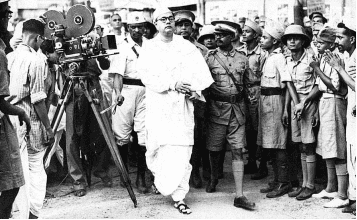New Delhi [India], August 17 (ANI): Ahead of Netaji Subhas Chandra Bose’s 80th death anniversary, his daughter Anita Bose Pfaff on Sunday urged Indians to support the transfer of his mortal remains to India for a final disposal.
In a statement, Anita Bose Pfaff paid tribute to Netaji and said, “As Netaji’s daughter, I invite the Indians of today who still remember him and respect him to support his posthumous return from exile, to support the transfer of his mortal remains to India for a final disposal.”
She highlighted Netaji’s role and the contribution of the Indian National Army in India’s independence struggle, and recalled the events that led to his death.
“The year 1945 saw the end of World War II: The attack by the United States of America on Hiroshima and Nagasaki with nuclear bombs was the ultimate cause for Japan’s surrender. For India this meant the end of Japan’s support for Netaji Subhas Chandra Bose’s and the Indian National Army’s struggle for India’s independence. After Emperor Hirohito of Japan had announced the surrender of Japan in a nationwide radio message on 15 August 1945, Netaji set out to fly to Tokyo on 17 August. After a stop-over in Taipei on 18 August 1945, on take-off his plane lost an engine and crashed. He was one of the passengers who suffered severe burns, and he died of his injuries that same day,” she said.
Anita Bose Pfaff noted that Netaji’s remains are still kept at Renkoji Temple in Tokyo.
“Netaji was cremated in Taipei, and his remains were taken to Tokyo. The head priest of the Renkoji Temple acceded to the request of members of the Indian community in Tokyo to keep Netaji’s remains safe ‘for a few months’. Almost 1000 months later, Netaji’s remains still rest in Renkoji Temple, well taken care of and honoured by the third generation of head priests,” she said.
She also recalled that Netaji once said that what he feared most was “to be in exile,” and stressed that his mortal remains should finally return to India.
“Once asked what he feared and abhorred most, Netaji is reported to have answered, ‘to be in exile’. In the 1930s he had returned to India from exile in Europe, even though he had been warned that he would be imprisoned immediately. He only escaped from India again when he had to avoid renewed imprisonment. From then on, he fought for India’s freedom from abroad – from exile, never to return alive. As Netaji’s daughter I invite the Indians of today who still remember him and respect him to support his posthumous return from exile, to support the transfer of his mortal remains to India for a final disposal,” she said.
According to the Ministry of Culture, Netaji Subhas Chandra Bose was a prominent nationalist leader who played a key role in India’s struggle for independence. Born on January 23, 1897, in Cuttack, Odisha, he abandoned a career in the Indian Civil Services to join the Congress, where he became known for his radical demand for complete independence. Twice elected Congress president, he resigned after differences with Mahatma Gandhi. During World War II, he led the Indian National Army with Japanese support against the British. Though unsuccessful militarily, his courage inspired millions. 
As per the Ministry, Netaji Subhas Chandra Bose reportedly died on August 18, 1945, in a plane crash in Taipei, where he suffered severe burns and later succumbed to his injuries. However, the exact circumstances of his death remain a subject of much “speculation” and “controversy”. The Ministry, on its official site, mentioned, “Despite various investigations, the exact circumstances of his death remain unresolved.” (ANI)
Disclaimer: This story is auto-generated from a syndicated feed of ANI; only the image & headline may have been reworked by News Services Division of World News Network Inc Ltd and Palghar News and Pune News and World News
HINDI, MARATHI, GUJARATI, TAMIL, TELUGU, BENGALI, KANNADA, ORIYA, PUNJABI, URDU, MALAYALAM
For more details and packages














